
Imagine that you, as the foremost writer of your time, have been ordered by your country’s leader upon pain of imprisonment, torture, and death to come up with a play that would dramatize a supposed plot against your government, solidify its legitimacy, and demonize many of your fellow citizens simply because of your words. What would you do?
This is the conundrum faced by Shag (aka William Shakespeare) in Bill Cain’s extraordinary Equivocation, back in L.A. for the first time since its 2009 pre-off-Broadway engagement at the Geffen in an absolutely superb production at Will Geer’s Theatricum Botanicum, one that tops its predecessor if only for the clarity that director Mike Peebler (doing outstanding work) and his all-around sensational cast bring to Cain’s labyrinthine tale.
In contemporary terms, the commission demanded by Queen Elizabeth I’s successor King James I might be akin to George W. Bush circa 2002 compelling say Steven Spielberg to make a movie about the events leading up to the terrorist attack on the Twin Towers, a movie which would place the blame squarely on Saddam Hussein and his “weapons of mass destruction.” Spielberg would surely know that by making the movie the President was demanding, he would be telling a deliberate lie, as well as demonizing “enemies” who just might just be blameless. On the other hand, to refuse the President’s demands would mean being accused of treason, and punished accordingly.
Equivocation takes us back to 1605, the year of “The Gunpowder Plot,” the King James I version of which has Roman Catholic conspirators planning unsuccessfully to blow up the Houses Of Parliament with thirty-six barrels of gunpowder, an act which would have killed James, his family, and his entire government.
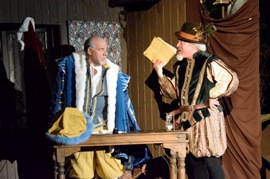 Shag tries to talk his way out of writing the play by maintaining that, “We don’t do politics. We do histories. True histories of the past,” and when that doesn’t work, he asks the King’s emissary, Secretary of State Robert Cecil, “Why me?” “Because,” Cecil replies, “You have discovered how to be all things to all men.”
Shag tries to talk his way out of writing the play by maintaining that, “We don’t do politics. We do histories. True histories of the past,” and when that doesn’t work, he asks the King’s emissary, Secretary of State Robert Cecil, “Why me?” “Because,” Cecil replies, “You have discovered how to be all things to all men.”
Realizing that he has no choice in the matter, Shag interviews various suspected conspirators, including Tom Wintour, already arrested and tortured almost to death, and Father Henry Garnet, supposed author of the plot.
It is during these interviews (and discussions with various members of his acting troupe) that Shag comes to the conclusion that all this tunnel-digging and those thirty-six barrels of gunpowder seem more than a bit fishy. After all, wouldn’t members of Parliament have heard strange noises as the tunnel was being built, and what about all the dirt that would have been displaced by the digging? And how on earth can you safely transport three dozen barrels of explosives without their doing what explosives are supposed to do?
Still, doubts or no doubts, the play must be written, and it is here that Shag begins to wonder if the solution to his problem might be in a concept Garnet explains thusly: “Don’t answer the question they’re asking,” he tells the playwright. “Answer the question beneath the question. The equivalent question.”
For example, if enemy soldiers come to your door asking if there is a Catholic inside and you know that in fact there is one, “equivocation” will allow you to reply “No,” because you realize that the real question being asked is “May I kill the man you’re hiding in there?”
Can Shag possibly find a way to equivocate himself out of his life-or-death dilemma by giving the King the play he really wants to see?
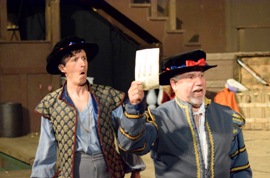 Here you have the basic premise of Bill Cain’s Equivocation, and even if that were all the play had on its mind or up its sleeve, it would doubtless still be an interesting piece of theater.
Here you have the basic premise of Bill Cain’s Equivocation, and even if that were all the play had on its mind or up its sleeve, it would doubtless still be an interesting piece of theater.
In Cain’s ingenious hands, however, Equivocation is much more than that.
Take for example, the scene in which we are witnessing the planning of the Gunpowder Plot by its conspirators, when suddenly (with the help of Zach Moore’s ingenious lighting) the plotters turn into Shag’s troupe of performers enacting the scene in question. Then (again in an instant), one of the players becomes the aforementioned King’s emissary, Sir Robert Cecil, commenting on Shag’s version of the events. We then go back to the conspiracy and after that back to the actors and then back to Sir Robert, all these changes taking place in the blink of an eye. Wow is right!
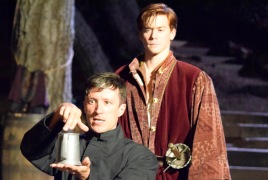 Equivocation works its wonders on many levels. As a political drama, it is every bit as compelling as say Frost/Nixon or Fahrenheit 911, and since Cain has his actors speak in contemporary English (except when doing Shakespeare), the play feels modern despite its characters’ period garb.
Equivocation works its wonders on many levels. As a political drama, it is every bit as compelling as say Frost/Nixon or Fahrenheit 911, and since Cain has his actors speak in contemporary English (except when doing Shakespeare), the play feels modern despite its characters’ period garb.
As a thought-provoker, Equivocation raises issues of ethics vs. political expediency. (Shag declares at one point, “I want to tell the truth. I just don’t want to get caught at it.”)
Shag and Judith’s conflicted relationship (even now, years later, he can’t help wishing it was she who had died years ago and not her twin brother) provides the play with some of its most touching moments.
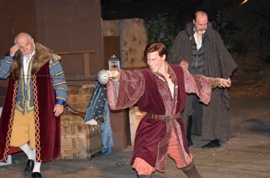 Then there are those scenes from Shakespeare, one from King Lear, with Shag’s actors complaining mid-scene that they don’t get what the playwright is going for, and another, near the end, from Macbeth, with the three witches brought delectably to life by the same actors.
Then there are those scenes from Shakespeare, one from King Lear, with Shag’s actors complaining mid-scene that they don’t get what the playwright is going for, and another, near the end, from Macbeth, with the three witches brought delectably to life by the same actors.
Finally, there is all the backstage excitement and drama which accompanies putting on a play, or in this case, of putting on a play-within-a-play.
Of Equivocation’s six actors, all but Ted Barton as Shag and Taylor Jackson Ross as Judith play multiple roles.
Alan Blumenfeld is the King’s smarmy emissary Sir Robert Cecil and (as company member Nate) plays Kent in King Lear and Banquo in Macbeth. Franc Ross is Father Garnet and (as company manager Richard) also gets to be both Lear and Macbeth. Dane Oliver snags the plum dual roles of doomed conspirator Tom Wintour and James, the Scottish King of England, as well as actor Sharpe (who plays Edgar and Macduff). Finally, Paul Turbiak transforms himself into plot leader Robert Catesby, chief prosecutor Sir Edward Coke, actor Armin, Lear’s Fool, Lady Macbeth, and that’s just the start of his myriad characterizations.
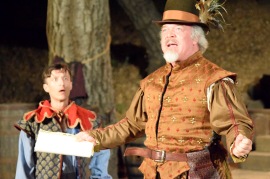 As he did recently in the title role in Coeurage Theatre Company’s production of Andronicus, Barton ignites the stage as Shag, a performance that lets us see not just the writer but the man (and the father in particular) in all his complexities and contradictions.
As he did recently in the title role in Coeurage Theatre Company’s production of Andronicus, Barton ignites the stage as Shag, a performance that lets us see not just the writer but the man (and the father in particular) in all his complexities and contradictions.
Blumenfeld’s transformations from hunchbacked, withered-armed, conniving Sir Robert to sensible, level-headed, dynamic Richard once again prove the A Noise Within staple the very definition of talent and versatility.
(Franc) Ross too commands the stage, both as lead actor Richard and as introspective Jesuit Priest Father Garnet, while Turbiak shines in role after role, from his amusing fool to his ladylike Lady Macbeth to his roles as conspirator and prosecutor to other too numerous to mention here.
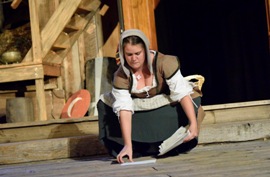 (Taylor Jackson) Ross’s unappreciated daughter Judith may well be the production’s stealth weapon and the glue that holds Equivocation together, from her droll complaints about Shakespearean soliloquies (which she makes in the form of a soliloquy), to the ingenious solution she offers her father to his dilemma, to the magical final moments of the play. If the role of Judith is “underwritten,” you’d ever know it from Ross’s unforgettable work.
(Taylor Jackson) Ross’s unappreciated daughter Judith may well be the production’s stealth weapon and the glue that holds Equivocation together, from her droll complaints about Shakespearean soliloquies (which she makes in the form of a soliloquy), to the ingenious solution she offers her father to his dilemma, to the magical final moments of the play. If the role of Judith is “underwritten,” you’d ever know it from Ross’s unforgettable work.
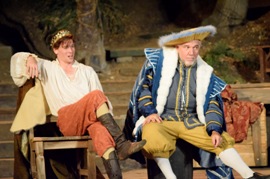 Finally, there is Theatricum newcomer Oliver blending finely-honed acting chops, striking good looks, and bona fide star charisma in three major roles. As Sharpe, Oliver is an intensely dedicated young actor with a mind of his own. As torture victim Tom Wintour, his work is poignant and heart-breaking. As King James, with his Scottish burr and royal crown, he is an absolute delight. And Oliver gets to play Shakespeare’s Edgar and Macduff as well. If his performance as Cordelian in the concurrently running Lear signals an actor to watch out for, his star turns in Equivocation make this unequivocal.
Finally, there is Theatricum newcomer Oliver blending finely-honed acting chops, striking good looks, and bona fide star charisma in three major roles. As Sharpe, Oliver is an intensely dedicated young actor with a mind of his own. As torture victim Tom Wintour, his work is poignant and heart-breaking. As King James, with his Scottish burr and royal crown, he is an absolute delight. And Oliver gets to play Shakespeare’s Edgar and Macduff as well. If his performance as Cordelian in the concurrently running Lear signals an actor to watch out for, his star turns in Equivocation make this unequivocal.
Equivocation ran nearly three hours at the Geffen, prompting this reviewer to write that it “could stand to lose about twenty minutes.”
Director Peebler has made those trims, the production at Theatricum running a much tighter two and a half hours, and it is all the clearer and more coherent for those cuts.
Design elements help as well, Ben Kahookele’s excellent period costumes taking the place of the Geffen’s contemporary garb. (Cain has written that he prefers it this way.) Not only does this make Equivocation feel more real, it aids considerably in distinguishing character from character. Ashton Williams’ properties are pitch-period-perfect as well.
A more literal scenic design than the Geffen’s (Theatricum Botanicum’s permanent outdoor set works to perfection) helps too in letting us know precisely where we are at each moment, while sound designers Ian Flanders and Christopher J. Jones have created some emotion-enhancing musical underscoring.
Kim Cameron is stage manager and Jenny Brum assistant stage manager.
It’s hard to imagine a more perfect coda to Theatricum Botanicum’s “Season Of Shakespeare” than Bill Cain’s Equivocation, a play that not only pays tribute to the writer of its season companions, but adds a contemporary playwright’s voice to the mix.
If Lear, All’s Well That Ends Well, Much Ado About Nothing, and the perennial Theatricum Botanicum favorite A Midsummer Night’s Dream are this season’s cake, then Equivocation is the icing on it, and delicious icing it is.
The Will Geer Theatricum Botanicum, 1419 N. Topanga Canyon Blvd., Topanga. Through October 4. Fridays at 8:00. Also Saturday October 4 at 8:00. Reservations: 310 455-3723
www.theatricum.com
–Steven Stanley
September 12, 2014
Photos: Ian Flanders
Tags: Bill Cain, Los Angeles Theater Review, Macbeth, Theatricum Botanicum


 Since 2007, Steven Stanley's StageSceneLA.com has spotlighted the best in Southern California theater via reviews, interviews, and its annual StageSceneLA Scenies.
Since 2007, Steven Stanley's StageSceneLA.com has spotlighted the best in Southern California theater via reviews, interviews, and its annual StageSceneLA Scenies.







 COPYRIGHT 2024 STEVEN STANLEY :: DESIGN BY
COPYRIGHT 2024 STEVEN STANLEY :: DESIGN BY